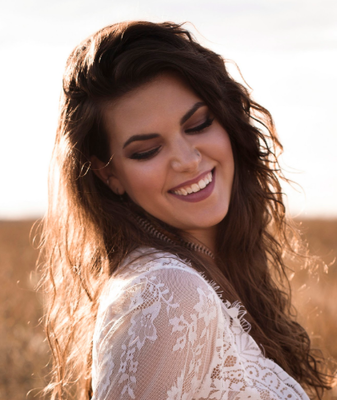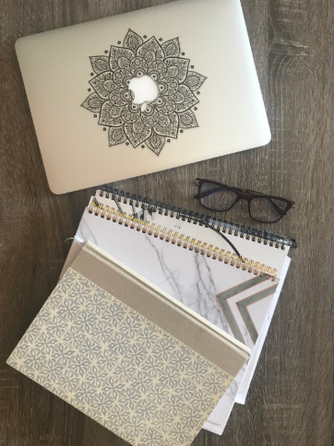"Coffee or tea is an impossible choice. Coffee in the morning, peppermint tea in the evening." What does a productive day of writing look like for you? Is it highly structured or highly flexible? Do you write out in public places or tucked away at home? A productive day of writing is usually a day off, which I don’t get that often! But when I do, I start with a coffee and clean my home a bit. I cannot work in cluttered spaces. I usually start with reading or a Pinterest crawl for setting and character inspiration (Pinterest is a great tool for writing, people). I’d say I’m more of a technical writer in the morning, working on planning, essays, editing, or responding to e-interviews *wink*. The evening is when my emotions are high and the muses come to visit. That’s when the magic happens. Overall, I wouldn’t say it’s very structured but there’s definitely a pattern to my best writing days. What is your worst writing habit? How do you work around it? Hmm. Tough one to narrow down. I’m working on writing in an active voice, rather than passive. Taking some editing courses definitely helped me understand the mistakes I make so I can catch them sooner. However, I would have to say that I struggle the most with my voice in writing. I’ll try to start something off in an eloquent or hyper-professional voice and lose my own in the process. I’ve actually started works over and pretended I was writing an email to a friend to tell the story. Once I find my own voice, I hang on to it and write without stopping to correct anything. I’ve noticed that this process results in much stronger writing and requires exceptionally fewer edits. "I’ve actually started works over and pretended I was writing an email to a friend to tell the story.
"I’m focusing most of my energy on my weekly Dungeons & Dragons campaign. In your article Internal Censorship in Writing you speak about writing for (or around) others versus writing for yourself. As you have already worked through writing about some very traumatic personal experiences do you have any advice for those who want to process their own personal history through writing but who also fear the repercussions? I have indeed written about a few traumatic personal experiences. Rereading what I’ve written helps me remember what I’ve been through when I’m being hard on myself, and that alone is valuable. My advice to those who want to write about their own history is to set up a safe space and a safe system. Write somewhere private. Change the names of characters and the setting of the story if it helps. Most of all, when you’re writing and you start to feel that fear or anxiety, keep going. I remember one night I was writing a scene that symbolically retold one of the times my ex had abused me. I was actually having a panic attack through the whole thing, but when I finished the scene I felt lighter. The burden of that story was now on paper (or screen, as it were). It’s like an offloading experience, revisiting the past to analyze it and rework it into something that you control. Writing about trauma is scary, but trust me: keep going. Writing through things can be in the form of fiction, poetry, memoir--you name it. However it needs to come out, get it out. No one has to read it but you. "Writing about trauma is scary, but trust me: keep going... However it needs to come out, get it out. You have been writing a fantasy novel for some time now. Can you tempt us with a few details about your project or is it all under wraps? Oof. Well, as it turns out, when you start working on a project at 14, your style, skill, intention, and story change drastically. Learning about myself and the story I want to tell with this novel is the priority right now, some of that learning done through working on my other projects, some through self-reflection. I’m cramming a lot into this novel: personal stories, social commentary, and a lot of wild ideas. Figuring out how to get them all to work together in a compelling plot has been the wall on which I’ve been banging my head for the last 10 years. As far as details go, I can offer a few things. It’s high fantasy and a big world with incredible diversity. Three female protagonists (oh yes, three) who find themselves in a situation much larger than them. It’s going to be dark, gritty, epic, and even a little sexy. Along with your writing you also work as an editor. If there was one common mistake that you could magically fix on every manuscript you come across what would it be? Redundancy. In my brief time editing, I have seen a lot of works that go over a topic too many times, skimming the surface of the matter instead of diving deep or moving on. During my time studying science, I learned how to write succinctly and it’s transferred to my editing style. There are definitely times you should go into detail and spend a lot of time on a certain subject, expanding and adding depth, but then there are moments where you have to trust the reader to extrapolate the full story from a brief snippet that you provide. Other times, writers are just trying to figure out what they want to say and when they find it, everything they’ve written leading up to it can be scrapped because it was only their journey to get to the point, not the point itself. A little bit of self-editing can go a long way! Writers have to ask, “Is this sentence important? Does it add something that nothing else does?” and go from there. "In my brief time editing, I have seen a lot of works that go over a topic too many times, What is your next big project and where can we stay up to date on it? Well, I can’t really say what the next big project will be because I’m not sure which one of my projects I’m going to sink my teeth into and make happen. However, I will definitely be keeping my website and social media updated with my thoughts, essays from school, and projects. Find out more about Adeline and her writing on her website.
0 Comments
Leave a Reply. |
AuthorJoshua Gillingham is an author, editor, and game designer from Vancouver Island, Canada. Archives
April 2022
Categories
All
|



 RSS Feed
RSS Feed
